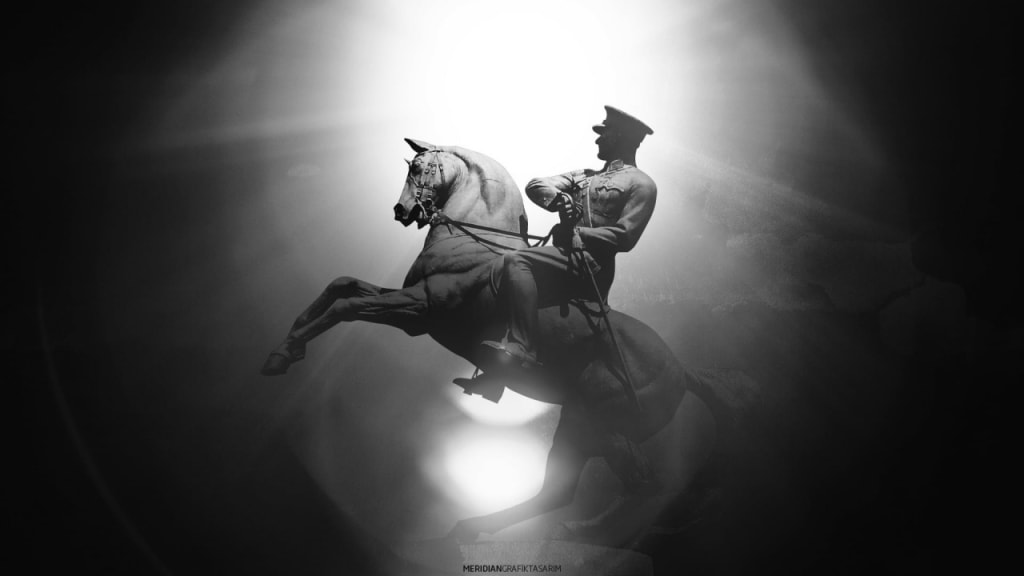Mustafa Kemal Atatürk: The Father of Modern Turkey
It was an article about the life of Mustafa Kemal Atatürk, the founder of Turkey.

Mustafa Kemal Atatürk, born on May 19, 1881, in the Ottoman city of Selanik (now Thessaloniki in Greece), was a Turkish army officer, revolutionary, and founder of the Republic of Turkey. He is considered the father of the modern Turkish nation, and his legacy continues to be felt in Turkey and beyond to this day.
Atatürk's Childhood and Education
Atatürk was born to Ali Rıza Efendi, a customs officer, and Zübeyde Hanım, a homemaker. His father died when he was just seven years old, and Atatürk was sent to live with his uncle in the city of Konya, where he received his early education.
At the age of 13, Atatürk was sent to a military school in Salonica, where he excelled academically and in sports. He later attended the Ottoman Military Academy in Istanbul, where he graduated in 1905 with the rank of lieutenant.
Military Career
Atatürk's military career began in the Ottoman Army, where he fought in the Balkan Wars and World War I. He quickly rose through the ranks, and by the end of the war, he was a colonel.
During World War I, Atatürk played a crucial role in the Gallipoli Campaign, where he led the Ottoman Army to victory over the Allied forces. The campaign was a turning point in the war and helped to establish Atatürk as a military hero in Turkey.
The Turkish War of Independence
After World War I, the Ottoman Empire was in a state of collapse. The Allies had occupied Istanbul, and the Ottoman government was forced to sign the Treaty of Sevres, which would have given away large parts of Turkish territory to foreign powers.
Atatürk, along with other Turkish officers, saw this as a betrayal of the Turkish people and decided to launch a war of independence against the occupying forces. He led the Turkish nationalist movement, which fought for independence from 1919 to 1922.
Atatürk's military leadership and political savvy were critical to the success of the Turkish War of Independence. In 1922, his forces defeated the Greek army, which had invaded Turkey, and secured Turkey's independence.
Founding of the Republic of Turkey
With the war over, Atatürk turned his attention to the task of rebuilding Turkey as a modern, secular republic. In 1923, he abolished the Ottoman monarchy and declared Turkey a republic. He became the country's first president and set about implementing a series of radical reforms.
Atatürk's Reforms
Atatürk's reforms were aimed at transforming Turkey into a modern, secular nation-state. He believed that the only way to ensure Turkey's survival in the modern world was to break with its Ottoman past and embrace Western values and institutions.
Atatürk's reforms included:
The adoption of a new legal code based on European models
The establishment of a secular education system
The abolition of the Islamic caliphate
The adoption of a new Turkish alphabet
The promotion of women's rights
Atatürk's reforms were controversial, and he faced opposition from religious and conservative forces in Turkey. However, he was able to implement many of his reforms and set Turkey on the path to becoming a modern, secular nation-state.
Legacy
Atatürk died on November 10, 1938, at the age of 57. His legacy as the founder of modern Turkey continues to be felt in Turkey and beyond.
Atatürk's reforms helped to transform Turkey from a backward, feudal society into a modern, secular nation-state. He remains a revered figure
Subscribe to see my articles and support me for more information.
Thanks for reading and taking the time.





Comments
There are no comments for this story
Be the first to respond and start the conversation.